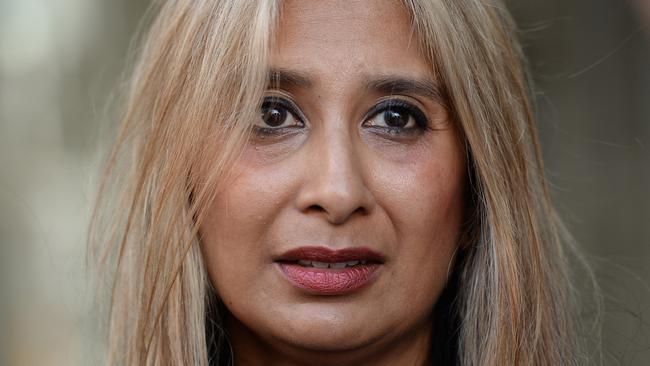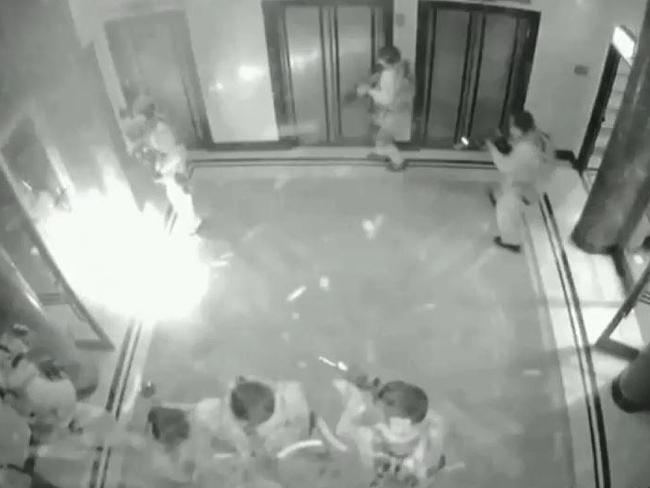Sydney siege inquest: Any ‘police failings need to be dealt’
DURING the last hour of the Sydney siege a police negotiator wondered if hostage Selina Win Pe was suffering “Stockholm Syndrome”.

DURING the last hour of the Sydney siege a police negotiator wondered if hostage Selina Win Pe was suffering “Stockholm Syndrome” after hearing her sympathise with gunman Man Monis.
The negotiator, known for legal reasons only as Darren, told the inquest that a colleague sent him a text message just before 1.30am on December 16, where he detailed what he heard Ms Win Pe say to Monis.
She was heard to say on a listening device that she was sorry about the way he [Monis] was being treated during the Lindt cafe siege, and it was this that made Dan wonder if she could be suffering from “Stockholm Syndrome”.
Stockholm Syndrome is a feeling of trust or affection that some hostages or kidnap victims can develop towards their captor.
It was either that or it was something along the lines “of self-preservation on the behalf of Selina”, Darren said.
He told Counsel Assisting Jason Downing he didn’t discuss his concern with his colleagues.
In a further revelation on Thursday, Darren said he learned that Monis fired a shot at the escaping hostages — and not into the air — after a call from Julie Taylor, who was among the group who escaped at 2.03am.
Asked if he passed the information on, Darren said “no I didn’t and I should have” but as soon as he got off the phone he heard the call for the emergency action plan to be activated, and tactical police began their assault on the cafe.
He was asked about the subject of Christmas lights that were shining into the cafe from Martin Place being switched off, as Monis was demanding, and whether police believed he would carry out his threat to kill Ms Wen Pe within 15 minutes if the demand wasn’t met.
Darren said the “consensus” reached from the negotiators and a psychologist was Monis wouldn’t “follow through” on the threat.

He said the lights being switched off could have been used as a way of showing Monis they were doing something for him, but there was no suggestion it be used as a direct bargaining for the release of a hostage.
Instead it was a “step by step” process, where they worked towards the ultimate aim of having all the hostages released safely.
Darren confirmed he wasn’t aware of the lights off request actually being made “hours” before. Other negotiators who have given evidence this week where they have conceded they were not told about the request as they took up negotiating duties.
Meanwhile, Coroner Michael Barnes has cut the number of witnesses still to give evidence at the inquest after fears the hearing could last weeks longer than scheduled.
The dramatic move came after an application from Counsel Assisting Jeremy Gormly earlier on Thursday that would see fewer than half of the 40 witnesses that were still to be heard to actually appear at the inquest.
Only 17 will now appear, beginning with the chief police negotiator on Monday.
The family of executed cafe manager Mr Johnson opposed the move, saying there were people on the list they wanted to hear from — including a sniper who saw Mr Johnson kneeling with his hands behind his head several minutes before he was shot dead.
Dr Peggy Dwyer, counsel assisting the family of Mr Johnson, objected to the application, said the cut would mean witnesses the family wanted to hear from would not be called. “He’s a sniper who saw Tori in the minutes before Tori was shot, on his knees with his hands above his head,” Dr Dwyer said.
“To have this argument at this late stage is really, really distressing to them.”
When he made the application Mr Gormly said there was a high level of risk, of another terrorist attack, before the December 2014 siege, and that risk remained.
“If there were police or other failures, it’s better to know about them sooner rather than later,” Mr Gormly said.
He said it was already clear from evidence given that some changes in siege management were needed.
In his decision this afternoon, Coroner Barnes said there was a “pressing need” for the siege report to be “finalised and published”.
He said there was no need for all the evidence to be heard as it would in a criminal hearing and the fact certain witnesses weren’t going to be called didn’t mean their statements were being “suppressed”.
The inquest was told his findings would influence the way terrorist events like the Lindt cafe were handled both in Australia and around the world.

